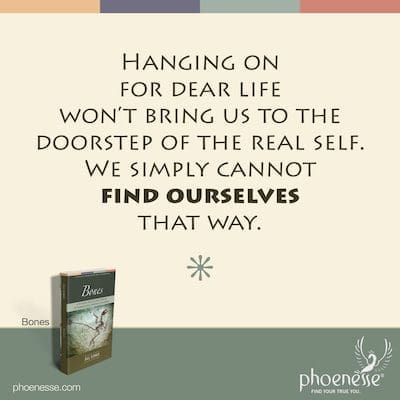What does it mean to “find yourself?” And by the way, what exactly is this “real self”? How is it the same or different from our essence or divine spirit? From our core, our Godself, or our inner light? These words and phrases are intentionally used interchangedly throughout these teachings. Because the minute a meaning gets lost behind the words, it dies. When a word turns into a label, we repeat it without thinking.

But meaning must forever be fresh and alive. Using new expressions can challenge us to re-experience what a word means, which kicks up our awareness a notch. And wow, there’s a lot packed into that word “awareness”. Whenever we can’t capture the alive, inner meaning of something, we always want to be aware of that.
Losing track of the meaning of a word illustrates what happens between our real self and the outer superficial layers of our personality. It’s our real self that connects with the living spirit of a word, whereas unfeeling repetition comes from our intellect. When our memory—which comes from our desire to re-experience something—recaptures an event using only our will, the meaning gets lost and becomes lifeless. Then all our experiences are just repetitive patterns, and our real self is no longer even in the picture.
If we boil it down, what obstructs the real self are our layers of confusion and error. On top of that sits our lack of awareness about our confusion and errors. So the only way to know our real self is to know ourselves. When we know we are confused, we are closer to our real self than when we are blind to our inner confusion. This is the case, even if we don’t have any solutions to our problems.
We are so conditioned to put a laser-like focus on the use of our thinking ability and willpower that we believe we can become ourselves through an act of sheer will; we think we can use our minds to develop spiritually. So, for example, we’ve all been told that being good and loving is a sign of spiritual growth. So we set off trying to control our thoughts and direct our actions to being good and loving. Too bad it doesn’t work that way. In the end, this adds up to wanting to be something we’re not.
The real self is not something that we control with our mind or with our will. It’s a spontaneous experience that comes about when least expected. And yet we think that if we could just nail these concepts using our fabulously overdeveloped brains, we will succeed and find our way home. Friends, it will never happen that way.
So what, we should turn off our brains? Not at all. To do the arduous work of following a spiritual path, we want to use our intellect to understand our errors and confusion, and to see how we have misdirected our will. Doing this will indirectly birth our real self, with all its spontaneity and creativity, into our reality.
There are certain stages we all travel through as we go along. Starting out, we are in a state of being, without awareness. Animals, plants and minerals are in this primitive stage. They are without self-consciousness. Primitive humans were only a hair removed from this stage. Yes, we had brains, but we still functioned mostly by instinct.
Slowly, over time, our wee brains began to develop and we got some better sense. So we can trace a slow progression in developing awareness, intellect and will, going from mineral to primitive people. Rolling forward in our development, we graduated from the state of unconscious being to the state of becoming.
The next stage then is the stage of becoming, and doing so with awareness. Here we’re striving to survive in the material world, using our intellect and will to get along. Both our outer will and our thoughts are part of the world of matter. So we can’t use them to arrive at a state of being, because that’s not matter. What we can use intellect and will for is cleaning up the errors and confusion that they themselves have created.
Our overproduction of thoughts and actions has created an obstruction to the real self, and that’s what we must deal with. So our first step in understanding ourselves is to understand our self-created blocks. We simply can’t go directly at our real selves—the state of being. There’s no direct route for our intellect and will to take.
Finally, we will reach the highest stage of development: the state of being, in awareness. Contrary to popular belief, we don’t immediately land in this stage after shedding our body. But from time to time, we may catch a glimpse of this stage while we’re still walking around. The likelihood of this happening directly correlates to how well we do in using our intellect and will to clear our inner hurdles. And not to using them for tasks they were not designed for.
So where are we now? Most of humanity is in the middle stage: the state of becoming, in awareness. Of course, there are lots of different degrees of becoming. For the sake of clarity, let’s make some arbitrary divisions. We spend the first half of this cycle cultivating and developing our intellect, memory, willpower and powers of discernment. Without these, we can never master matter.
We need our memories, we need to learn, and we need some smarts in order to deal with life. Plus, we need to use our will if we hope to overcome our destructive, animalistic instincts, which slumbered along during the state of being in unawareness. Otherwise, we could never stop ourselves from acting badly towards others and ourselves.
But in the second half of the cycle, we have a grip on our actions and we’re starting to realize there’s more to life than material satisfaction. We wish for a higher state of being, not just because some religious teacher told us about it, or because we’re unhappy, but because something deep inside is urging us in that direction.
But we screw up when we try to get there using the same tools we used to get a handle on the material life. The same tools don’t work for entering the spiritual life. Trying to reach the mountaintop of the higher state of being by using intellect and willpower causes us to construct images—wrong conclusions—of how we think we should be and of how life should be, according to our limited past experiences.
All this leads to repression and self-deception, and a non-acceptance of ourselves as we are right now. The intellect and will have trapped themselves again, and haven’t gotten any closer to freedom and spiritual growth. We haven’t left the first half of the cycle, but instead are more confused and therefore suffering more.
In other words, thoughts and willpower that got us this far during the stage of becoming, can, when used wrongly in the state of being, lead to confusion and suffering. Not exactly what we were going for. Note, we’re not saying that using the mind and will causes suffering. But using them when they shouldn’t be used ends up having that effect.
The only way for a harmonious state of being to come about is by accepting the state we’re in right now—even though it’s disharmonious. We have to understand our current situation if we ever hope to grow out of it. We can’t struggle our way out by covering up what we don’t want to see. Continuing in this vein will only turn the mind and will into more destructive tools, which eventually will serve to send us packing, but hopefully this time in the right way.
We can think of intellect and will as temporary tools. They give our actions and intentions direction and are super-helpful in navigating the physical world and deciding to learn the truth about ourselves. But we can’t use them for everything—like for spirituality, which is above everything, all about love.
Think about it: we can’t force ourselves to love. We might think we can, but in reality we can’t. Which doesn’t mean we don’t love. But love can only come into being once we’ve cleared out our errors and confusions, our dependency on others opinions and our preconceived ideas about the way things are. Yes, we need to fully understand these obstacles before we can remove them, but then love will come into being all by itself, the same way the real self comes into being, all by itself.
So we can’t just make up our minds that we’re going to be good people who love and have compassion and humility. We can, however, make up our minds to figure out what’s causing us to not be all that. Then we can go about the business of removing what stands between us and the full life we could be living, from our real self.
An important difference between our superficial intellect and our real self is that we can direct, manipulate and govern the intellect using our will; we can’t do this with the real self. Of the two, the real self is the more intelligent one. It is more certain and more reliable, and it’s always working in our best interest. With the real self, there is no choice to make—it’s just there as the one and only truth, with no doubt or questioning.
The superficial intellect is the one with all the doubts and questions. When we have complete understanding and acceptance of what’s in us right now, the real self will be the result. That’s when it can manifest, forever coming up with new ways to experience various aspects of life. It doesn’t have its feet stuck in the past like the mind does. It sees life as through the eyes of a child.
But when our uber-impressionable mind has petrified an experience into an image, or a generalization about life, then all our experiences are limited by our filter. The freshness of life goes stale. We wring the truth and beauty of the present moment out of life by squeezing it into a mold of the past. Remember, the mind is the origin and keeper of these images.
If we want to dissolve the past experiences that are etched into our mind—both our conscious and unconscious mind—and free ourselves of these limiting structures, we have to become aware of them. Yep, there’s that word “awareness” again. And we can only understand our images in all their glory if we face ourselves in complete candor. We have to stop hankering after what we should be and sit with what we are.
We can’t do this by moralizing. The problem isn’t one of morals. But sure as heck, moralizing can keep us from seeing what’s causing the misery in our life. And misery is always self-produced. No matter what we may think or how much we want it to be otherwise, it’s always an inside job. And so too is finding the solution.
What happens is that we become ready to enter the second half of the cycle—approaching the state of being, in awareness—but we step up to the gate with our intellect and our will in our hands. We think that if we can just tamp down our will, manipulate our thoughts and discipline our emotions, we’ll be in like Flynn. We might even achieve some semblance of precarious peace, making us believe we are on the right track. But then our inner reality busts loose in a smoldering display of not-that-good-though, and we despair.
We have to let go of trying to live up to ideals that we’re just not ready for. We need to give less weight to the concepts and more to what we’re really feeling, so we don’t obscure the real gem: the real self. But without our tools of will and intellect, we don’t feel safe. We don’t trust ourselves without rules and laws and concepts to guide us. If we don’t know what’s right and good, how can we let go?
What we don’t realize is that if we were to see ourselves as we really are, we would see that there’s nothing to fear. So first we must see that we’re holding on tight. Then we can ask why. We need to face how big a role security is playing, and realize that hanging on for dear life won’t bring us to the doorstep of the real self. We simply cannot find ourselves that way.
Return to Bones Contents
Read Original Pathwork® Lecture: #104 Intellect and Will as Tools or Hindrances to Self-Realization



